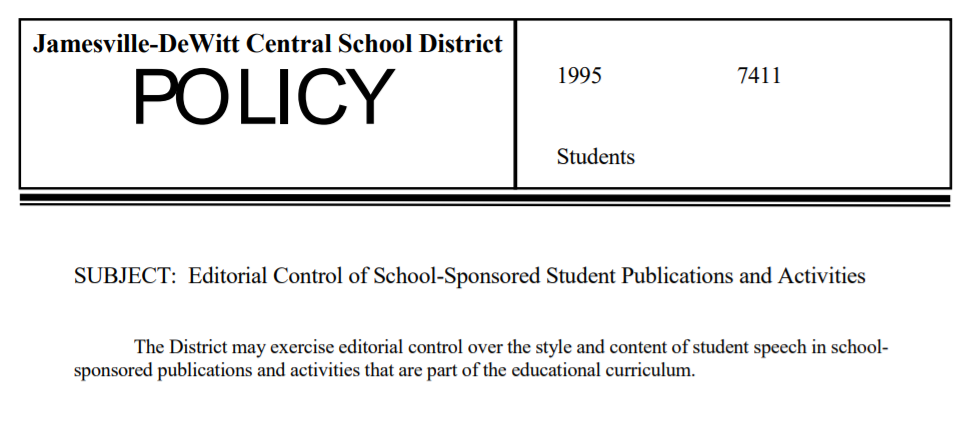As The RamPage continues to become a more independent and student-run newspaper, it is imperative that it retains its full first amendment rights.
Currently, the policy which depicts how The RamPage is to run (Policy 7411) states, “The District may exercise editorial control over the style and content of student speech in school-sponsored publications and activities that are part of the educational curriculum.” In short, this means that the district can take down any article they want to — whether it be a controversial article on a serious topic or an Ariana Grande album review. This policy eliminates all possibilities for students to combat the striking of an article and does not describe in any form the type of content that can be taken down.
The Student Press Law Center (SPLC) is a non-profit organization composed of non-partisan lawyers who ensure press freedom in public and private schools are being respected in an appropriate manner. To meet their goal of all students retaining their full right to freedom of speech, they provide an outline for an editorial policy. Their outline is based around the precedents set by Supreme Court cases specifically regarding the freedom of speech within schools (Tinker v. Des Moines, Hazelwood v. Kuhlmeier, and Morse v. Frederick). It is clear that an updated policy is necessary, and the Editorial Board of The RamPage believes that now is the time to request change.
The requested policy in full will be linked at the bottom of this article, but due to sheer length, it will just be summarized in this document. To preface this section, it is important to understand that not a lot of this policy actually changes the power dynamic between The RamPage and the Jamesville-DeWitt School Board. It just puts the rights that the paper already expresses into writing. First, it provides clear and basic definitions of terms that will be later used in the document, such as: libel, non-school sponsored student media, school-sponsored student media, orderly operation of the school, prior restraint, prior review, slander, student media advisor, and student journalist. Next, it gives the student editorial board the power to decide what stories go in featured sections and the responsibilities the student journalists have (accuracy, verification of quotes, and making ethical decisions). After this, it depicts the role of the student media advisor and their role within the paper. In short, they will provide guidance, but ultimately do not control what the paper will or will not post, unless they believe an article falls under the exceptions of free speech. Fittingly, the next section discusses the exceptions to freedom of speech. This policy does not allow for publication of articles that are “libelous or slanderous, constitute an unwarranted invasion of privacy, are obscene, violate federal or state law, so incite students as to create a clear and present danger of the commission of an unlawful act, the violation of a lawful school district policy, or the material and substantial disruption of the orderly operation of the school,” all of which are defined within the new policy itself.
The last section outlines an appeal process if an article is taken down or if an article is requested to be taken down. This is the only section of the proposed document which would be entirely new to the district. Currently, an article can be taken down at any time for any reason without any guidance or process for the student journalist to take to ensure their rights are being respected. This is what the appeal section of this policy seeks to change. First, a school official must provide the editorial board of The RamPage and the current superintendent with a written statement about wanting an article taken down. Next, within five business days, the editorial board may present a written statement in dissent to the proposed striking of the article to the superintendent and the appropriate school official. A hearing with the superintendent will happen no later than five business days after the statement from the student editorial board is received. In this hearing, the school official must prove that the article is in line with one of the exceptions to free speech. If the superintendent sides with the school official, the student journalist may try the same process with the school board (however, the article will be taken down until a ruling from the board is reached). If the school board sides with the journalist, the article is reinstated. If the school board sides with the school official, the student journalist reserves the right to seek out judicial review.
In addition to this, the current policy is outdated for how The RamPage currently is operated. Editor-in-Chief Isaiah Steinberg (‘23) has not taken a journalism elective; rather, he learned everything on his own. Part of the current policy states “…activities that are part of the educational curriculum.” However, The RamPage is no longer a part of the educational curriculum, rather an independent, autonomous club. Students enrolled in journalism classes are encouraged to send their work to the respective section editor for publication, but they are not required to, nor is the section editor required to publish their work. Due to this, the paper cannot be considered part of the “educational curriculum,” and therefore, this part of the policy is irrelevant and outdated.
Furthermore, the current policy goes against everything that J-DHS claims to value. At the beginning of the year, each student is handed a Student Handbook. This handbook includes information about graduation requirements, consequences for actions, but most importantly, the J-DHS mission statement and beliefs. According to the 2021-2022 handbook, Belief Number Five states, “Trust and fairness should permeate all relationships.” How can fairness be achieved in all relationships if the school retains the power to remove any article for any reason? It cannot. Furthermore, in the Student Rights section of the Code of Conduct, right five states that all students retain the right to “Develop and express opinions, beliefs, and values, provided such expression is not disruptive, slanderous, or insubordinate.” Once again, how can this be true when it is directly contrary to the current editorial policy? If the district has the right to take down any article, how can students freely express their opinions, as the district has so clearly laid out the right for them to do? They cannot. In the newly proposed policy, the rights of the paper are so carefully laid out so that content that is “disruptive, slanderous, or insubordinate,” as defined in the policy itself, are not protected and can be taken down. If the Jamesville-DeWitt School District cares about the beliefs of students as they claim to, they must adopt a new editorial policy for The RamPage. It is not only appropriate, but necessary to the integrity and virtue of the district.
There is no excuse for the current policy in place. J-DHS prides itself on its diversity, yet its editorial policy destroys the possibility for diversity of thought. It is time to give students their rights. It is time for The RamPage to have a level of security from the constant fear of articles being taken down. It is time for a new editorial policy.































